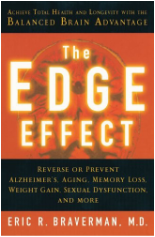
Melissa Fougere, a naturopathic doctor with a master's degree in neuroscience, finds Braverman's method helps many of her patients, and in a myriad of ways.
You too can use this fascinating technique to begin to better understand yourself or those you care about. Read on!

When was the last time you felt like the best version of yourself? Do you feel balanced? Are you acting in accord with your true nature? Or have you lost your edge?
Disease and symptoms of poor health are messages from the body, a sign that things are not functioning well. It‘s tempting to cover them up with medications, to drink coffee for energy, smoke cigarettes for concentration, to take sleeping pill for insomnia, or use antidepressants to improve your mood. Our physical and emotional symptoms, however, are signs that something needs to be investigated. Once we understand that chronic fatigue, irritability, anxiety, an inability to lose weight, and cravings for sugar, carbohydrates or dairy products are indications that our neural chemistry is in disharmony, we can work towards achieving the amazing health and vitality we were born for.
 Dr. Eric Braverman
Dr. Eric Braverman The 4 Types of People
Have you ever wondered why some people are great at multitasking while others have a fantastic memory for numbers but not names? Why are some people fulfilled by doing carpentry while others delight in playing the piano? You’ve undoubtedly noticed that some people are the life of the party, while others prefer to stand back and observe. These differences are based on each individual’s unique brain composition, specifically the balance of neurotransmitters, which accounts for how we think, feel and act.
Braverman describes how our brain chemistry creates our personality (the way we think, act, function and feel) and even influences our physical health. The core of his thesis is that we each have a dominant neurotransmitter that defines who we are, as well as a signature composition of the four primary neurotransmitters: dopamine, serotonin, GABA and acetylcholine. By connecting our behaviour and temperament with what is known about neurotransmitters we can discern what is happening in our brains from our symptoms alone. This can free us of the need for expensive neural-imaging devices, which are inaccessible to the average person.
The first symptoms you experience when you start to lose what Braverman calls your “edge” are usually caused by a deficiency in your dominant neurotransmitter. If the deficiency is not addressed, the other neurotransmitters start to burn out, too, as they try to compensate for the initial deficiency.
The Edge Effect method uses a questionnaire that identifies your dominant neurotransmitter and determines your neurotransmitter deficiencies. Once discerned, neurotransmitter-specific diet advice and remedies can be prescribed.
I’ve seen these solutions work wonders for my patients: pounds melted off in a patient who couldn’t lose weight, depression finally lifted in someone who took anti-depressants for years, while in other patients brain fog disappeared, memory returned, and physical vitality was restored. I’ve seen a chronically stressed-out person finally attain balance, witnessed significant diminishment of chronic pain and seen sound sleep return to a patient suffering from insomnia.
How to Determine Your Dominant Neurotransmitter
In the first part of his book, Braverman describes the four different natures (or personality types) associated with each of the governing neurotransmitters. The reader then completes a questionnaire to help determine which neurotransmitter controls her personality and health.
Here is a summary of each personality type:
Dopamine: The energizer bunny
Dopamine-natured people are strong-willed, confident and fast on their feet. They are highly rational, and know exactly what they want and how to get it. They have excellent focus and take pride in their achievements. These people are perhaps more comfortable with facts and figures than with feelings and emotions, and do not respond well to being criticized by others.
Dopamine natures are strategic thinkers, and good at problem-solving. They function well under stress and may become doctors, scientists, inventors, researchers, engineers or architects. They enjoy reading, working on crossword puzzles and strategic games. They are persevering, very alert, and often require less rest than others.
Acetylcholine: The intuitive dreamer
Acetylcholine types regard the world in sensory terms. They are highly creative, inventive, and open to new ideas. They always take other people into consideration and are devoted to things running optimally, no matter how much effort is required. Acetylcholine individuals are extremely social and even charismatic. They love meeting and interacting with people or reading about the lives of others. They take pleasure in writing, expressing their ideas, and communicating.
Acetylcholine people are ideal as counselors, yoga teachers, religious leaders, artists, writers, advertising professionals and actors.
GABA: The calm, responsible one
A GABA-dominant individual is consistent, stable, objective and concerned for others. You can rely on him to show up and be there when you need him. He is sensible, remains calm in the face of chaos and is not vulnerable to wide swings of emotion or outbursts of anger. The GABA-natured person is practical, likes to be organized and finds schedules comforting. He is a team player, keeps the group together and stays focused on the matter at hand. He acquires pleasure from fulfilling obligations and taking care of those he loves. GABA dominant people usually believe in institutions and traditions and enjoy history books, biographies and collecting memorabilia. They tend to gravitate to careers as administrators, security officers, nurses, accountants, medical technicians, air-traffic controllers, news reporters, meeting planners, or homemakers.
Serotonin: The thrill-seeking adventurer
People with high serotonin levels know how to live in the moment and are highly responsive to sensations. They love to participate in all that life has to offer and thrive on change. They vary where they take their vacations and love to find new ways to do tasks. They try new foods, seek new hobbies and quickly make new friends. They have a natural disdain for order, structure and authority but are optimistic, cheerful, easygoing and the life of the party. They are passionate in relationships and intensely loyal, but dislike being tied down as they have a need for freedom.
A serotonin-dominant person gravitates to employment that offers variety, interactions with different people and a changing environment. Their excellent hand-eye coordination makes them well-suited to occupations requiring tools.
Are You Deficient in Neurotransmitters?
The second part of Braverman’s book describes and assesses neurotransmitter deficiencies. Some of the primary physical and emotional symptoms that result from a deficiency of dopamine, acetylcholine, GABA or serotonin are described below.
Dopamine deficiency: The lonely procrastinator
When balanced, dopamine-dominant people are organized, accommodating and easy to get along with. They are flexible, giving and willing to help their friends. When out of balance, they lack the energy to socialize, tend to recluse and shy away from social interaction. They avoid meeting deadlines and when they are angry steer clear of confrontation. Physically, early warning signs that your dopamine is deficient are: loss of energy, sluggishness, or “the blues”.
Acetylcholine deficiency: The eccentric perfectionist
Acetylcholine controls the speed of your brain and is likely to be deficient if you have memory problems, or slow thinking. When deficient, the normally creative, intuitive and sensing acetylcholine-dominant person may seem to behave strangely. Additionally, their once hard-working and detail-oriented natures can give way to extreme perfectionism, rigidity and difficulty making decisions.
GABA deficiency: The unstable drama queen
In balance, a GABA person enjoys taking care of others, but when deficient she lacks control, experiences tumultuous relationships, acts impulsively, and rapidly fluctuates from one mood to another. GABA is calming and is the major inhibitory neurotransmitter in the brain. It controls the brains rhythm, keeps mental and physical functioning at a steady pace and keeps all the other biochemicals in check. If you are anxious, nervous or irritable these could be signs that you are GABA-deficient. When in balance a GABA dominant person encourages change and growth in herself and others but when out of balance she’ll insist on being the center of attention and may need constant reassurance of her worth.
Serotonin deficiency: The self-absorbed rule breaker
When balanced, a serotonin-oriented person can work around mandates and standards in order to accomplish goals that require thinking outside the box. When deficient, however, he makes his own rules with little care for others. He becomes short-sighted and proceeds rashly without considering consequences or the feelings of others. Normally, a serotonin-oriented person is high-achieving, but when out of balance he becomes self-absorbed and loses the ability to understand the feelings of others. When serotonin is lacking, your brain’s ability to recharge itself is compromised. You feel tired, like a spinning top and are often unable to get a restful sleep.
Putting it all Together
The goal of Braverman’s method is symmetry, to remedy deficiencies and allow the brain to work seamlessly and in harmony. When your neurochemicals are in sync you’re more likely to enjoy your work, happiness should come easily, and you will feel healthy and strong. When balanced your dopamine will allow you to tackle tasks with lucidity and energy, your GABA will keep you calm and centered, acetylcholine will allow you to connect with others, and your serotonin will give you good quality rest.
Neurotransmitter deficiencies can be something you are born with, or they may arise with age as fewer hormones are produced. Stress and poor diet can also create deficiencies; eventually, our neural chemistry can no longer compensate for these insults and symptoms emerge.
I have seen Dr. Braverman’s method work so well with so many of my patients that I have incorporated his questionnaire into my initial assessment of most new patients. If you’re interested in determining your neurotransmitter nature and deficiencies, read The Edge Effect. Remember, however, that a book is never a replacement for sound medical advice. If you are concerned about neurotransmitter imbalance, consider consulting with myself, or another doctor who understands Dr. Braverman’s work and specializes in brain health.
Dr. Fougere is a naturopathic physician at The Core Center of Health in Kelowna, B.C., Canada. She has a master’s degree in neuroscience and is a clinical research scientist with Ascenta Health.
Copyright Melissa Fougere, 2014. All rights reserved.
